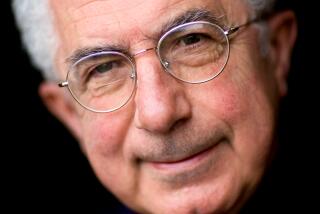Book Review : Autobiography of a Witness to History
- Share via
A Life in Peace and War by Brian Urquhart (Harper & Row: $25; 390 pages)
A young officer named Brian Urquhart was among a planeload of British paratroopers who were called upon to make a demonstration jump for Churchill, Eisenhower and other dignitaries despite the high winds that swept over Salisbury Plain on a blustery day in 1941. In fact, the wind scattered the paratroopers, and Urquhart found himself heading directly toward the row of chairs where the important spectators were arrayed for the show.
“Shouting a warning and trying to side-slip, I landed with a sickening bump in front of Gen. Eisenhower,” Urquhart recalls in his autobiography, “A Life in Peace and War.” “Detaching my parachute harness, I came to a halt, stood up, and, for want of anything better to do, saluted. The British . . . behaved badly, muttering: ‘Disgraceful,’ ‘Damned poor show,’ and so on . . . Gen. Eisenhower, on the other hand, was perfectly charming. ‘Are you all right, son?’ he asked. ‘You shouldn’t be jumping in this wind anyway.’ ”
Urquhart’s anecdote is a nice example of what is best about “A Life in Peace and War.” Urquhart, the former under secretary-general of the United Nations, was fated to be a witness to history, often by accident, and he met his fate with poise, ironic wit and a highly developed sense of occasion. Although more often a spectator than an actor, Urquhart tumbled into many other moments of crisis in recent history--the ill-fated attack on Arnhem, the liberation of Bergen-Belsen, the founding of the United Nations and virtually every international flash point where the United Nations has attempted to work its will, from the Suez Canal and the Congo in the ‘50s and ‘60s to Cyprus, Namibia, India, Lebanon and Iran in the ‘70s and ‘80s, and virtually every Arab-Israeli conflict in between.
By another happy accident, Urquhart--who describes himself as an “international civil servant”--is also an accomplished memoirist whose prose is graceful, often funny and unfailingly readable. Still, no man can survive in the little theater of personal and national ego that is the United Nations without iron-clad discretion and a mastery of protocol. As a result, Urquhart tends to be oblique in his reminiscences about the great men and women with whom he has contended, and he is guarded about his private life.
Thus, for example, Urquhart treats the former secretary-generals whom he served with restraint. He downplays the notion that the plane crash in which Dag Hammarskjold died was an assassination: “No serious evidence of a conspiracy has ever been produced.” Of U Thant, Urquhart writes: “At first he appeared emotionless and moon-faced, and he was, by Western standards, in some ways rather simple-minded.” And I found no mention at all of the recent revelations of Kurt Waldheim’s alleged complicity in Nazi atrocities; Urquhart characterizes the former secretary-general as “an energetic, ambitious mediocrity.”
Meticulously Indirect
Even when he confesses his own passions and prejudices, Urquhart is meticulously indirect. When it comes to Israeli prime ministers Menachem Begin and Yitzhak Shamir, each of whom served in the Zionist underground before statehood, Urquhart pauses to recall the assassination of U.N. mediator Folke Bernadotte--and lays the blame on Shamir’s underground unit, the so-called Stern Gang.
“There was never much doubt as to who had killed Bernadotte, but in all the subsequent indignation about terrorism he is rarely mentioned,” Urquhart writes. “His assassins went unpunished. Some of them became successful and respected members of society.”
As a result, Urquhart explains, he can’t get too worked up about terrorism. “Since Bernadotte’s murder and the conspiracy of silence that followed it, I have had difficulty in joining without reservation in the hue and cry over ‘terrorism,’ ” Urquhart writes. “Leaders of activist ‘liberation’ movements, of which Shamir and Begin were two prominent examples, have seemed to me to be a category apart, not to be judged by conventional standards but rather for their persistence and ruthlessness in overcoming great odds in pursuit of a political goal.”
Ruthless Leaders
And one of those ruthless leaders who is in “a category apart,” he allows us to understand, is Palestine Liberation Organization chairman Yassir Arafat, who “for all his unshaven and dumpy appearance, had a certain feline charm and a mind like a grasshopper.”
Still, Urquhart’s perspective on history is compelling, if also sometimes aggravating, and the book is full of fascinating anecdotes and asides, including surprising cameo appearances by Karen Blixen (Isak Dinesen), Guy Burgess and W. H. Auden.
Urquhart’s account of his exploits during the U.N. intervention in the Congo is a book in itself, faintly reminiscent of Joseph Conrad, and full of memorable portraiture and dangerous comedy. And if Urquhart is prone to scold the critics of the United Nations, he makes a moving and articulate argument in favor of international diplomacy in world affairs.
After the tragedy of the failed Arnhem offensive, Urquhart writes, “I doubted everything, tended to distrust my own as well as other people’s judgment, and became deeply skeptical about the behavior of leaders. I never again could quite be convinced that great enterprises would go as planned or turn out well, or that wisdom and principle were a match for vanity and ambition.”
Still, he defends his devotion to the United Nations and its noble (if feeble) role in the affairs of men and nations: “Reason, justice and compassion are small cards to play in the world of politics, whether international, national or tribal, but someone has to go on playing them.”
More to Read
Sign up for our Book Club newsletter
Get the latest news, events and more from the Los Angeles Times Book Club, and help us get L.A. reading and talking.
You may occasionally receive promotional content from the Los Angeles Times.








